The hand sifting through the small box feels intrusive, and perhaps it is. The necessary intrusion into the artifacts of a life that has run its course, Arnon Goldfinger’s film The Flat (Hadira), begins a month after his grandmother’s death, as the family takes on the task of clearing out her home.
A staggering collection of gloves, handbags and two fur fox stoles are among the items that must be sorted through in this flat. When we are no longer present to tell our own stories, objects become the mute narrators of our biography. Those who were close to us, children, grandchildren, siblings, friends, are left to confront the paintings, furniture, books, clothes and letters, and to decide, as Goldfinger’s mother says to the family gathered in the flat: “What to keep and what to discard.”
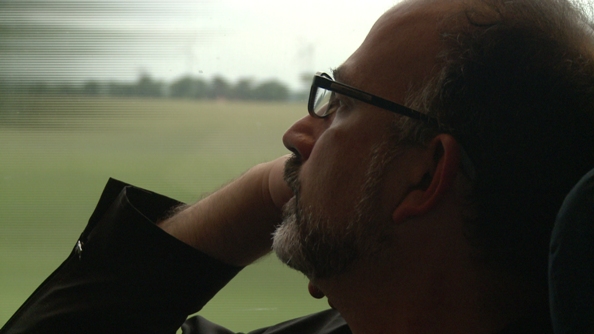
The flat in question is on the third floor of a Bauhaus building in Tel Aviv, the home of Kurt and Gerda Tuchler. Jews who immigrated to Palestine from Germany in the 1930s, the dark heavy furniture, thick heavy tomes lining the long bookshelves, boxes and boxes of letters, an array of fashion accessories suggest that in their lifetime, the Tuchlers were inclined to keep everything. Like many Jews who came from Germany, they remained attached to the language, culture, and way of life of their early years in Europe. Goldfinger recalls that as his grandmother did not speak much Hebrew, and he was not inclined to learn German, they carried on their conversations at the flat in English, over apple strudel.
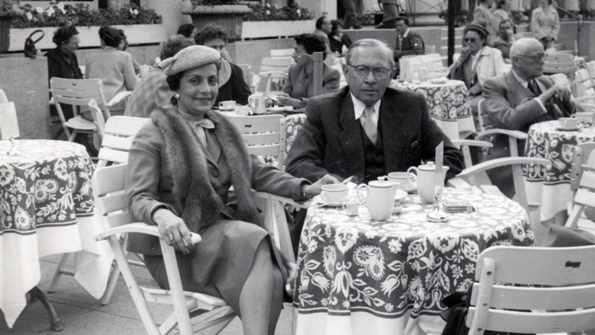
Goldfinger is a participant/observer in the process of dismantling the flat, with its tragic-comic moments. A book expert, Micha Adler, accessing the extensive library, dismisses one book after another in German accented Hebrew: “Shakespeare, this is something no one reads anymore. Americans buy it by the meter, even though they have no idea what is written inside, but it looks good. Balzac too, no one reads.” Yet Goldfinger has a hard time letting go. For him the past is not just something to be cleared away, bagged and dumped; these relics are a repository of memory, an emotional, cultural and intellectual legacy, something to be known and understood.
A dedicated archaeologist of the all too recent past, Goldfinger’s research into the accoutrements of his grandmother’s life evolves into a suspenseful search that leads him to unexpected places and encounters. An emotional, psychological and intellectual thriller, there is no way that I would spoil the pleasure of viewing The Flat for the first time by revealing these discoveries. Yet even after seeing the film twice, the mysteries at the core of this story continue to trouble the mind, defying explanation.
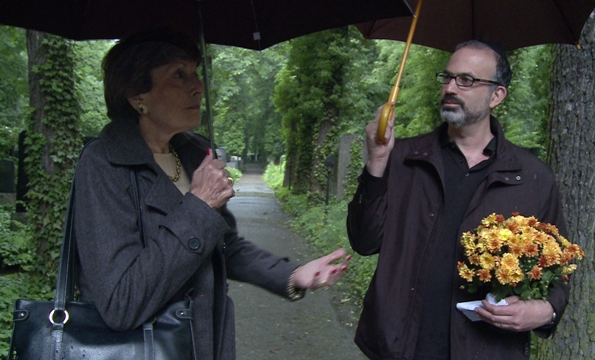
The film’s riveting plot evolves in the context of an aesthetically pleasurable film, with original music by Yoni Rechter, meticulous timing and structure that imbues the film with a visually symbolic aspect. Goldfinger approaches each of his investigative encounters bearing a bouquet of flowers, as good manners would dictate. Grandmother would approve. The recurring image is at once comic and pointed, reinforcing the past’s deep influence on the present, the complex constructs of family and identity. The film opens on a black screen, then, as the blinds open on a small window to let in shafts of light, one realizes that this is the interior of the flat, which has been closed in darkness since the grandmother’s death. Goldfinger opens windows, closets, doors and archives, literally and figuratively, letting in the light.
Goldfinger’s first documentary, The Komediant (1999) won the Ophir Award for Best Documentary and Best Documentary at the Haifa International Film Festival. The Flat, winner of the Best Documentary Award at the 2011 Jerusalem Film Festival, is one of five films currently nominated for the 2011 Ophir Awards. The Flat is currently showing at the Tel Aviv and Jerusalem cinematheques.
The Flat (Israel 2011, 97 minutes, Hebrew, English and German)
Producers: Arnon Goldfinger, Thomas Kufus
Screenplay: Arnon Goldfinger
Editor: Tali Halter Shenkar
Cinematography: Philippe Bellaiche, Talia (Tulik) Galon
Original music: Yoni Rechter
Research: Mareike Leuchte, Franziska Lindner, Arnon Goldfinger
The film was made with the support of the New Fund for Cinema and Television, Channel 8, FFA – German Federal Film Board, DFFF – German Federal Film Fund, and MBB – Medienboard Berlin-Brandenburg.

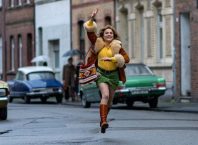

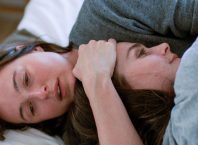
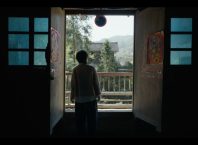
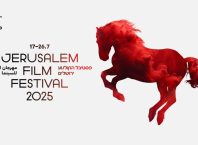
A reminder that we cannot forget our history. Beautiful, disturbing and thought provoking.
Thank you for writing and sharing your personal story. I agree so much with your words: “I feel for all parties in this.”
Just watched the movie last night on Netflix, here in the U.S. Our family has a similar heartache in it, that we cannot seem to rap our minds around. Our grandfather was a loving and kind man, but used his influence, to get his neighbors, the Japanese, interred. Our mother, his daughter, would not speak to him for years.
I could feel the hurt and bewilderment on the part of Arnon, and his wish to understand. I too came across our families involvement, in family papers given to me. I feel for all parties in this, as finding out the truth about someone,is crushing.
Just watching the film now on Netflix in Canada. Seems to be a recent addition. Very interesting.
[…] Adir Miller, Traffic Light (International Emmy for Best Comedy 2010), Arnon Goldfinger, director of The Flat (Israel Academy Award for Best Documentary 2011), Dan and Noit Geva, Noise (premiered at Docaviv […]
Does anyone know if the movie is going to be screened in the US? If so, when?
Looks like a beautiful film. Proud to call Arnon my friend since circa 1991, when we met in Kiev – and later in Tel-Aviv thanks to his effort. Looking forward to seeing it in New York one day.
Hi, David,
Michael was my father. He passed away in ’94 (too young). This film was made by my cousin Arnon, of whom we are incredibly proud. Feel free to contact me at dtuchler@gmail.com
– Dan
I grew up in Tel Aviv in the 1940’s and had a close friend, Michael Tuchler – undoubtedly of the family in this documentary. If anybody reading this knows anything about Michael (dead or alive) please get in touch.
Comments are closed.